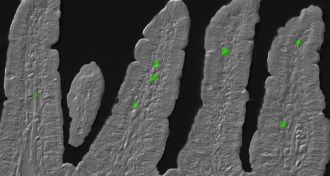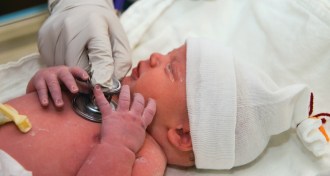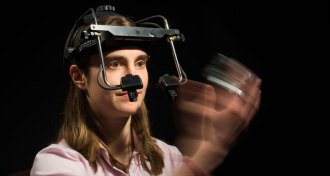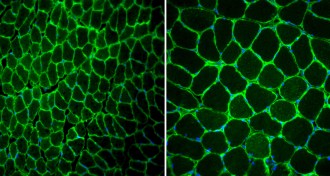News
-
 Climate
ClimateHistorical events linked to changes in Earth’s temperature
Ozone treaty, wars and Great Depression influenced global warming rate, scientists find.
-
 Life
LifeImmune system follows circadian clock
Mice with jet lag have boosted supply of cells linked to inflammation.
By Meghan Rosen -
 Planetary Science
Planetary ScienceMeteor explosions like this year’s Russian fireball more common than thought
Chelyabinsk-sized rocks may come to Earth every 30 years, on average.
By Andrew Grant -
 Life
LifeNewborns’ weak immunity may allow helpful bacteria to gain a foothold
Though infant immune systems raise risk of infection, they also allow good microbes into the body, study in mice shows.
By Nathan Seppa -
 Neuroscience
NeuroscienceAutism may be detectable in baby’s first months of life
Infants later diagnosed with an autism spectrum disorder lose tendency to gaze at others’ eyes during first half-year, researchers find.
-
 Astronomy
AstronomyBillions and billions of Earth-sized planets call Milky Way home
Using Kepler data, astronomers estimate that a sizeable fraction of the galaxy’s sunlike stars have Earth-sized planets that could support liquid water.
By Andrew Grant -
 Earth
EarthGreenhouse gas injections may unleash earthquakes
Plans to pump carbon dioxide into the ground to mitigate climate change could create other problems.
By Beth Mole -
 Neuroscience
NeuroscienceBrain enables sight without light
Sensory cross talk may underlie ability to see one’s own hand moving when it’s pitch black.
By Bruce Bower -
 Astronomy
AstronomyAstronomers explain planets’ backward motion
Giant planets in distant orbits may be reversing the direction of their closer-in neighbors.
By Andrew Grant -
 Life
LifeSteroids boost muscles for the long haul
Experiments in mice suggest that effects don’t end when doping does.
-
 Cosmology
CosmologyDark energy search gets murkier
Supernova measurements muddle scientists’ efforts to explain universe’s accelerating expansion.
-
 Health & Medicine
Health & MedicineExercise seems to limit bad falls in elderly
Regular exercise might limit broken bones due to bad falls in elderly people.
By Nathan Seppa